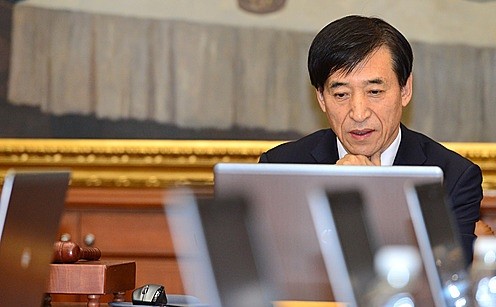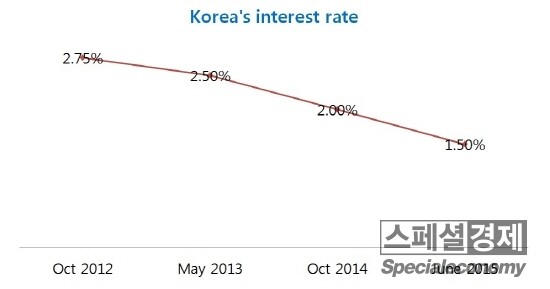
[Special Economy=Eunji Kim]The Federal Reserve has increased its zero-interest rate by 0.25% last month, and Korea was handed over a dilemma of whether to do the same—or not.
On Thursday, the Bank of Korea held a Monetary Policy Committee to decide on the following matter, and in the end, decided to freeze the interest rate for seven consecutive months.
Prior to this decision, the interest rate has been maintained at 1.5% and there was an outlook that this will continue, which happened to be right.

For Korea to lower this level, there rises a problem of surging household debts, followed by a increasing number of citizens unable to pay back their bills—add to that the interest rate.
But to increase it, the current economic slowdown provides as a barrier.
Another problem is: China's recession and its plunging stock market. Some analysts say Korea should rather lower its interest rate to push forward for monetary easing to deal with the China shock.
And, with the Bank of Korea reducing this year's economic growth rate from 3.2% to 3.0%, there are more voices for the above policy to be pursued.
| 한은, 금리인상 7개월째 동결…배경은? [스페셜경제=김은지 기자]미국이 금리를 지난달 인상한 가운데 한국은행도 따라서 인상할지 여부를 결정하는 올해 첫 금융통화위원회를 14일 오전 개최했다. 이날 한은은 기준금리를 7개월 연속 동결하기로 했다. 앞서 한은의 기준금리는 작년 6월 이후 1.5% 수준에서 6개월째 동결된 상황이었다. 이번 달 에도 그대로 유지될 것이라는 가능성이 높게 보였고 전망대로 결정됐다. 미 금리 인상에 따라서 한은이 한국 금리를 인하하기에는 급증한 가계부채가 부담이 되고 또 인상하려면 현재 경기 둔화가 방해 하고 있기 때문이다. 또 다른 불안한 요소는 중국 경기 침체와 중국 증시 폭락이다. 일각에서는 부진한 중국 경제에 잇따른 충격으로 인해 금리인하가 포함되어 있는 완화적 통화정책으로 대처해야 한다고 목소리를 높이고 있다. 게다가 한은이 올해 경제성장률 전망치를 3.2%에서 3.0%으로 하향조정 했기 때문에 ‘완화적 통화정책’을 추진해야 한다는 의견이 더 많아질 수 있다. |

